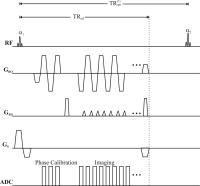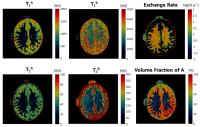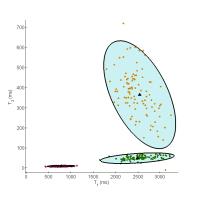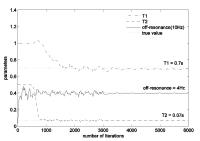| |
13:30
 |
0428.
 |
Pseudo Steady State Free Precession for MR-Fingerprinting 
Jakob Assländer1, Steffen Glaser2, and
Jürgen Hennig1
1Dept. of Radiology - Medical Physics, University
Medical Center Freiburg, Freiburg, Germany, 2Dept.
of Chemistry, Technische Universität München, Munich,
Germany
This work discusses steady state issues in SSFP-based
fingerprinting sequences. It is shown that variations of the
flip angle destroy the steady state, causing instabilities
with respect to intra-voxel dephasing. A pseudo steady state
can be achieved by adapting TR and TE to a given flip angle
pattern, restoring the typical SSFP behavior. Furthermore,
an iterative reconstruction algorithm for fingerprinting
data is proposed.
|
| |
13:42
|
0429.
 |
Towards Judging the Encoding Capability of Magnetic Resonance
Fingerprinting Sequences 
Karsten Sommer1, Thomas Amthor1, Peter
Koken1, Mariya Doneva1, and Peter
Börnert1
1Philips Research Europe, Hamburg, Germany
A key question of magnetic resonance fingerprinting (MRF) is
the appropriate choice of sequence parameters to achieve a
high sensitivity to the tissue parameters of interest. In
this contribution, different candidates for a measure of MRF
sequence encoding capability are evaluated. While
interpretation of measures that rely on local or global dot
products proved difficult, a ‘brute force’ Monte Carlo
approach showed good agreement with experimental results. By
restricting this Monte Carlo method to small local
dictionaries, substantial acceleration could be achieved.
|
| |
13:54
|
0430.
 |
In Vivo Optimized Fast MR Fingerprinting in the Human Brain 
Ouri Cohen1,2, Mathieu Sarracanie1,3,
Matthew S. Rosen1,3, and Jerome L. Ackerman1,2
1Athinoula A. Martinos Center, Charlestown, MA,
United States, 2Radiology,
Massachusetts General Hospital, Boston, MA, United States, 3Physics,
Harvard University, Cambridge, MA, United States
In this work we demonstrate an in vivo human brain
application of a previously described schedule optimization
method for rapid MR Fingerprinting. The method is validated
in a phantom by comparison to a spin-echo sequence. The
optimized schedule allowed acquisition of a single slice in
2.4 seconds without the use of any k-space undersampling.
|
| |
14:06
 |
0431.
 |
MR Fingerprinting with Chemical Exchange (MRF-X) for In Vivo
Multi-Compartment Relaxation and Exchange Rate Mapping 
Jesse Ian Hamilton1, Anagha Deshmane1,
Mark Griswold1,2, and Nicole Seiberlich1,2
1Biomedical Engineering, Case Western Reserve
University, Cleveland, OH, United States, 2Radiology,
University Hospitals, Cleveland, OH, United States
MR Fingerprinting with Chemical Exchange (MRF-X) is
presented for in vivo quantification of relaxation times,
volume fraction, and exchange rate for tissues with two
compartments. Data are presented in healthy volunteers in
both brain and leg skeletal muscle and compared with
previously reported measurements.
|
| |
14:18
|
0432.
 |
Low Rank Matrix Completion-based Reconstruction for Undersampled
Magnetic Resonance Fingerprinting Data 
Mariya Doneva1, Thomas Amthor1, Peter
Koken1, Karsten Sommer1, and Peter
Börnert1
1Philips Research Europe, Hamburg, Germany
In this work, we present a method for reconstruction of
undersampled Magnetic Resonance Fingerprinting (MRF) data
based on low rank matrix completion, which is performed
entirely in k-space and has low computational cost. The
method shows significant improvement in the MRF parameter
maps accuracy compared to direct matching from undersampled
data, potentially enabling more robust highly accelerated MR
Fingerprinting.
|
| |
14:30
|
0433.
 |
Spiral MRF at 7T with simultaneous B1 estimation 
Guido Buonincontri1, Rolf Schulte2,
Mirco Cosottini3,4, Stephen Sawiak5,
and Michela Tosetti4,6
1INFN Pisa, Pisa, Italy, 2GE
Global Research, Munich, Germany, 3Department
of Radiology, University of Pisa, Pisa, Italy, 4IMAGO7
Foundation, Pisa, Italy, 5Clinical
Neurosciences, University of Cambridge, Cambridge, United
Kingdom, 6IRCCS
Stella Maris, Pisa, Italy
MR fingerprinting (MRF) can be used to rapidly estimate
quantitative parameters in MRI. However, the homogeneity of
the transmission radiofrequency field (B1+) can introduce
errors in the measurements. Here, we modified spiral MRF
acquisitions and included the effects of B1+ directly in the
reconstruction framework. We could obtain B1-corrected T1
and T2 maps without using an extra scan. These advances are
demonstrated in human brain images at 7T.
|
| |
14:42
|
0434.
 |
AIR-MRF: Accelerated iterative reconstruction for magnetic
resonance fingerprinting 
Christopher C. Cline1,2, Xiao Chen1,
Boris Mailhe1, Qiu Wang1, and
Mariappan Nadar1
1Medical Imaging Technologies, Siemens
Healthcare, Princeton, NJ, United States, 2Biomedical
Engineering, University of Minnesota, Minneapolis, MN,
United States
We propose an accelerated iterative reconstruction for
magnetic resonance fingerprinting (AIR-MRF) with
comprehensive integration of temporal compression of
fingerprints and accelerated dictionary matching with
approximate nearest neighbor search. Faster and more
accurate MRF reconstruction was achieved, as demonstrated by
simulations with a numerical phantom.
|
| |
14:54
|
0435.
 |
The Partial Volume Problem in MR Fingerprinting from a Bayesian
Perspective 
Debra F. McGivney1, Anagha Deshmane2,
Yun Jiang2, Dan Ma1, and Mark A.
Griswold1
1Radiology, Case Western Reserve University,
Cleveland, OH, United States, 2Biomedical
Engineering, Case Western Reserve University, Cleveland, OH,
United States
Magnetic resonance fingerprinting (MRF) is a technique that
allows us to produce quantitative maps of tissue parameters
such as T1 and T2 relaxation times, however it is
susceptible to artifacts due to the partial volume effect.
The aim of this work is to provide a blind solution to the
partial volume problem in MRF using the Bayesian statistical
framework. A complete description of the algorithm is
presented as well as applications to in vivo data.
|
| |
15:06
|
0436.
 |
MR Fingerprinting Reconstruction with Kalman Filter 
Xiaodi Zhang1,2, Rui Li1, and Xiaoping
Hu2
1Center for Biomedical Imaging Research,
Department of Biomedical Engineering, School of Medicine,
Tsinghua University, Beijing, China, People's Republic of, 2The
Wallace H. Coulter Department of Biomedical Engineering,
Georgia Institute of Technology and Emory University,
Atlanta, GA, United States
The reconstruction of MR fingerprinting currently relies on
matching with a dictionary. In this paper, we describe an
alternative method using Kalman filter instead of dictionary
in the reconstruction. The method is shown to allow the
reconstruction of MR Fingerprinting without the use of
dictionary and achieves better results.
|
| |
15:18
 |
0437.
 |
Analysis of estimation error from system imperfection in MRF 
Taehwa Hong1, Min-Oh Kim1, Dongyeob
Han1, and Dong-Hyun Kim1
1Electrical and Electronic engineering, Yonsei
university, Seoul, Korea, Republic of
MR fingerprinting (MRF) is a rapid method for quantifying
multiple tissue properties. However, estimation errors can
increase when systematic imperfections including RF and
gradient coils exist. In this study, we analyzed estimation
errors from non-ideal slice profile and gradient delay by
simulation. Our results showed that these systematic
imperfections can cause significant errors in parameter
estimation.
|
|












